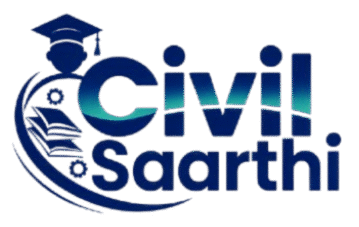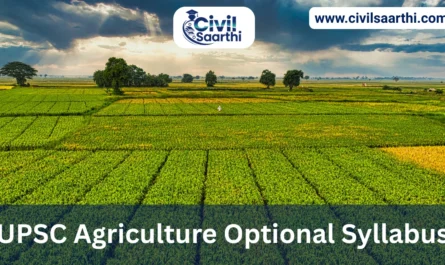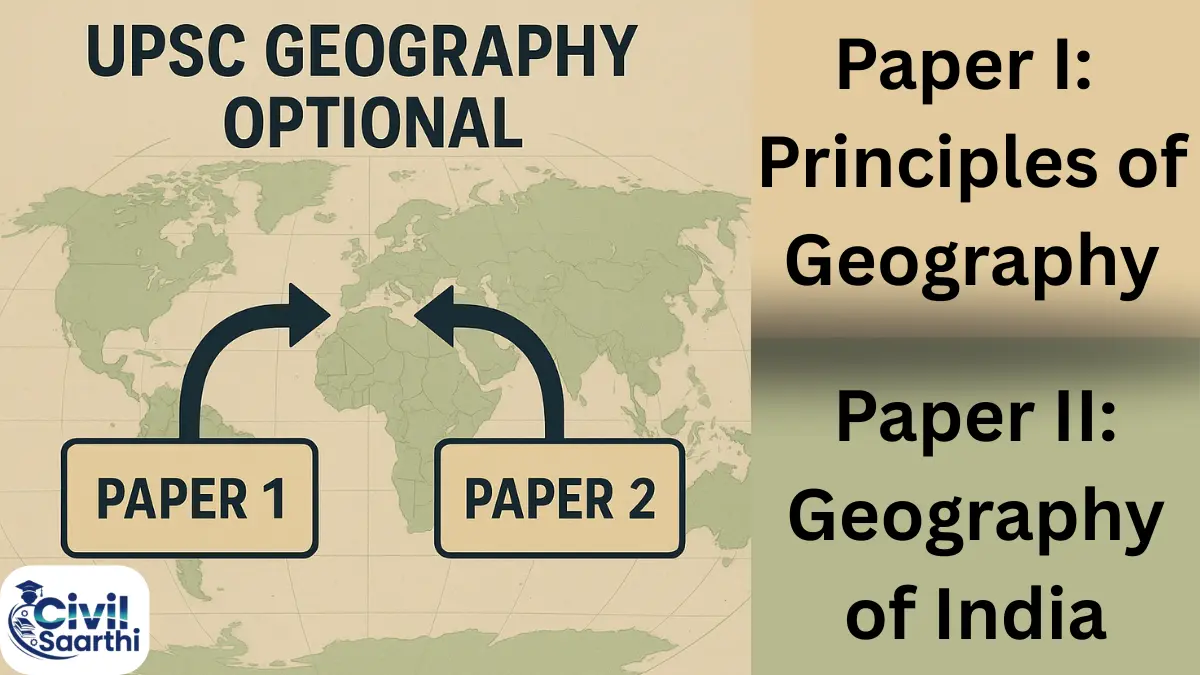The UPSC Mains Syllabus 2025 for GS 3 encompasses a diverse range of topics that assess a candidate’s understanding of economic development, technology, environment, security, and disaster management. This paper is designed to evaluate the analytical and problem-solving abilities of aspirants in the context of contemporary issues. The detailed syllabus has been discussed below in the article.
UPSC Mains Syllabus 2025 for GS 3
The UPSC Mains Syllabus 2025 for GS 3 focuses on critical aspects of national development such as economic growth, agriculture, science and technology, environment, internal security, and disaster management. It tests a candidate’s understanding of policies, reforms, and their real-world impact, along with awareness of current developments. Covering topics like budgeting, liberalization, cropping patterns, technology indigenization, pollution control, and security challenges, the syllabus demands analytical thinking and a clear grasp of how these domains shape governance and progress in India.
UPSC Mains Syllabus 2025 for GS 3 Overview
The UPSC Mains Syllabus 2025 for GS 3 is structured to test candidates on various subjects that are crucial for national development and security. It includes topics related to the economy, agriculture, science and technology, environment, internal security, and disaster management.
| UPSC Mains Syllabus 2025 for GS 3 Overview | |
| Main Topics | Subtopics |
| Economic Development |
|
| Agriculture |
|
| Science and Technology |
|
| Environment |
|
| Internal Security |
|
| Disaster Management |
|
UPSC Mains Syllabus 2025 for GS 3: Official
General Studies-III: Technology, Economic Development, Bio diversity, Environment, Security and Disaster Management
- Indian Economy and issues relating to planning, mobilization, of resources, growth, development and employment.
- Inclusive growth and issues arising from it.
- Government Budgeting.
- Major crops-cropping patterns in various parts of the country, – different types of irrigation and irrigation systems storage, transport and marketing of agricultural produce and issues and related constraints; e-technology in the aid of farmers.
- Issues related to direct and indirect farm subsidies and minimum support prices; Public Distribution System- objectives, functioning, limitations, revamping; issues of buffer stocks and food security; Technology missions; economics of animal-rearing.
- Food processing and related industries in India- scope’ and significance, location, upstream and downstream requirements, supply chain management.
- Land reforms in India.
- Effects of liberalization on the economy, changes in industrial policy and their effects on industrial growth.
- Infrastructure: Energy, Ports, Roads, Airports, Railways etc. Investment models.
- Science and Technology- developments and their applications and effects in everyday life.
- Achievements of Indians in science & technology; indigenization of technology and developing new technology.
- Awareness in the fields of IT, Space, Computers, robotics, nano-technology, bio-technology and issues relating to intellectual property rights.
- Conservation, environmental pollution and degradation, environmental impact assessment.
- Disaster and disaster management.
- Linkages between development and spread of extremism.
- Role of external state and non-state actors in creating challenges to internal security.
- Challenges to internal security through communication networks, role of media and social networking sites in internal security challenges, basics of cyber security; money-laundering and its prevention.
- Security challenges and their management in border areas – linkages of organized crime with terrorism.
- Various Security forces and agencies and their mandate.
Topic-wise detailed UPSC Mains Syllabus 2025 for GS 3
General Studies Paper 3 of the UPSC Civil Services Mains Examination evaluates a candidate’s understanding of the Indian economy, science and technology, environment, internal security, and disaster management. The paper tests not just theoretical knowledge but also the ability to apply concepts to current developments and government policies.
1. Economic Development
The UPSC Mains Syllabus 2025 for GS 3 emphasizes understanding the Indian economy’s structure and functioning. Candidates should focus on economic planning, resource mobilization, growth patterns, employment trends, and budgeting processes.
Key Areas:
- Indian Economy and issues relating to planning, mobilization of resources, growth, development, and employment.
- Inclusive growth and associated issues/challenges.
- Government budgeting.
- Effects of liberalization on the economy, changes in industrial policy, and their effects on industrial growth.
- Infrastructure: Energy, Ports, Roads, Airports, Railways, etc.
- Investment models (e.g., PPP).
2. Agriculture
Agriculture remains a significant part of the UPSC Mains Syllabus 2025 for GS 3, focusing on cropping patterns, irrigation methods, agricultural marketing, and the integration of technology in farming practices.
Key Areas:
- Major cropping patterns in various parts of the country.
- Different types of irrigation and irrigation systems.
- Storage, transport, and marketing of agricultural produce and issues and related constraints.
- e-Technology in the aid of farmers.
- Economics of animal rearing.
- Food processing and related industries in India – scope and significance, location, upstream and downstream requirements, supply chain management.
- Issues related to direct and indirect farm subsidies and minimum support prices; Public Distribution System – objectives, functioning, limitations, revamping; issues of buffer stocks and food security; Technology missions.
- Land reforms in India.
3. Science and Technology
The UPSC Mains Syllabus 2025 for GS 3 includes advancements in science and technology and their applications in daily life. Candidates should be aware of recent developments and their implications.
Key Areas:
- Recent developments and their applications and effects in everyday life.
- Achievements of Indians in science & technology.
- Indigenization of technology and developing new technology.
- General awareness in the fields of IT, Space, Computers, Robotics, Nanotechnology, Biotechnology.
- Issues relating to intellectual property rights.
4. Environment
Environmental issues are a critical component of the UPSC Mains Syllabus 2025 for GS 3, focusing on conservation efforts, pollution control, and environmental impact assessments.
Key Areas:
- Conservation.
- Environmental pollution and degradation.
- Environmental impact assessment.
5. Internal Security
The UPSC Mains Syllabus 2025 for GS 3 covers internal security challenges, including terrorism, cyber threats, and the role of security forces in maintaining national integrity.
Key Areas:
- Challenges to internal security through communication networks, role of media and social networking sites in internal security challenges.
- Basics of cyber security; money-laundering and its prevention.
- Security challenges and their management in border areas; linkages of organized crime with terrorism.
- Various Security forces and agencies and their mandates.
6. Disaster Management
Disaster management is an essential topic in the UPSC Mains Syllabus 2025 for GS 3, focusing on disaster preparedness, mitigation strategies, and institutional frameworks.
Key Areas:
- Disaster and disaster management.
Booklist for UPSC Mains Syllabus 2025 for GS 3
The books mentioned below for UPSC Mains Syllabus 2025 for GS 3 are carefully chosen to cover the static syllabus and support dynamic topics through relevant and reliable sources.
| Booklist for UPSC Mains Syllabus 2025 for GS 3 | |
| Topic | Recommended Books |
| Indian Economy |
|
| Agriculture |
|
| Science and Technology |
|
| Environment and Ecology |
|
| Disaster Management |
|
| Security Issues (Internal Security) |
|
| Liberalisation, Industrial Policies |
|
| Investment Models & Infrastructure |
|
| Inclusive Growth & Government Schemes |
|
| Current Affairs (Cross-cutting all topics) |
|
Preparation Tips for UPSC Mains Syllabus 2025 for GS 3
The Preparation Tips for UPSC Mains Syllabus 2025 for GS 3 have been listed below based on the experience shared by various UPSC Toppers of recent years.
- Understand each topic in the syllabus clearly and make a topic-wise checklist.
- Integrate current affairs with static subjects using newspapers and PIB updates.
- Refer to Economic Survey, Budget, and government reports for facts and examples.
- Practice answer writing regularly with previous year questions and mock tests.
- Revise important government schemes and policies frequently.
- Use diagrams, flowcharts, and real examples to enrich answers.
- Prioritise high-weightage areas like economy, environment, and internal security.
- Prepare micro-notes for quick revision before the exam.
- Solve and analyze the last 5–7 years’ Mains GS 3 questions.
- Maintain consistency in reading, revision, and answer writing.
FAQs on UPSC Mains Syllabus 2025 for GS 3
What is the focus of the UPSC Mains Syllabus 2025 for GS 3?
The UPSC Mains Syllabus 2025 for GS 3 focuses on economic development, technology, environment, internal security, and disaster management.
Does the UPSC Mains Syllabus 2025 for GS 3 include agriculture?
Yes, agriculture is a significant part, covering cropping patterns, irrigation, and food processing.
Are current affairs important for the UPSC Mains Syllabus 2025 for GS 3?
Yes, staying updated with current developments is crucial for topics like economy and technology.
What kind of questions are asked from science and technology in the UPSC Mains Syllabus 2025 for GS 3?
Questions often relate to recent technological advancements and their applications.
Is environmental conservation part of the UPSC Mains Syllabus 2025 for GS 3?
Yes, topics include conservation efforts, pollution control, and environmental impact assessments.
How is internal security addressed in the UPSC Mains Syllabus 2025 for GS 3?
It covers challenges like cyber threats, terrorism, and the role of security agencies.
Does disaster management feature in the UPSC Mains Syllabus 2025 for GS 3?
Yes, it includes disaster preparedness, mitigation strategies, and institutional frameworks.







